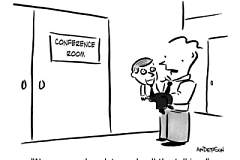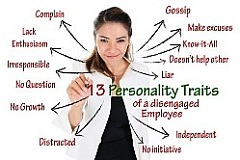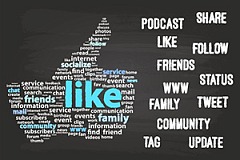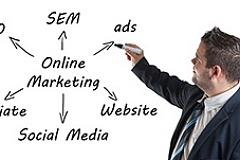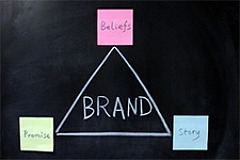 Are you looking to improve your Facebook marketing techniques? Start with the Facebook algorithm.
Are you looking to improve your Facebook marketing techniques? Start with the Facebook algorithm.
As of December 31, 2017, Facebook boasted about 2.13 billion monthly active users. This makes it the most popular social platform in the world.
As such, it offers marketers an ideal platform for engagement and interaction with customers. [quotesright]Most importantly, you can use it to attract new customers and scale your business to a whole new level. [/quotesright]
However, your success depends on your understanding of Facebook algorithm, and how you can use it to attain brand awareness. In this post, we're going to share everything you need to know about using FB to grow your brand.
How Facebook Algorithm Works
One thing you need to know about FB posts is that they are not just served randomly to users in their News Feed. [quotes]The complicated Facebook algorithm serves the posts depending on the probability for users to interact with them. [/quotes]
The algorithm focuses on several factors when serving content. This includes inventory, signals, predictions about users, and overall score. These factors help FB to ensure the best overall experience for its users.
One of the essential factors for marketers is signals, which are basically considerations about content. [quotesright]Facebook uses signals, such as proximity of the page to users and the overall engagement a post has, to show posts in News Feed. [/quotesright]
The social media giant is continuing to refine and update its algorithm to use signals that favor increased user interactions. This includes average time spent on content, story type, how informative the content is, and overall engagement. Plus, Facebook wants to prioritize posts from friends and family as they tend to get better engagement.
Ranking Factors
When planning the content strategy for your brand, it's important to understand ranking factors that the Facebook algorithm uses. This way, it will be easier to determine the likelihood of your posts to perform better.
1. Comments
Posts with lots of comments show that they're attracting conversations and discussions from users. Thus, they're likely to be often shown in users' feed. However, don't use engagement baits as they'll result in a demotion for your posts.
You can increase comments by sharing meaningful and relevant stories that prompt users to join the conversation.
2. Sharing
Users share content in two ways: They post links or content within their Messenger accounts, or they can share publisher links shared by friends. This means the post can be shared either privately or publicly.
[quotesright]Whatever the case, sharing is an important ranking factor for posts. [/quotesright] The more shares your posts receive, the higher they're likely to rank. Plus, shared posts should spark conversations to be able to rank well.
3. User Reactions
While not as strong as sharing and commenting, user reactions show active engagement, and FB considers them when ranking posts. This is because not all people are expected to share and comment on posts even if they like them.
Instead, they use reactions to show thoughts and views. Getting more reactions means Facebook algorithm will likely rank your posts high.
How to Create a Facebook Marketing Strategy
A successful Facebook marketing campaign is more than just knowing, generally, what ranking factors may be used by Facebook. It requires a well thought out plan that is focused on achieving some goal or goals that increase your sales and profitability. The following is a game plan for doing exactly that.
1. Define Your Goals
Every marketing effort needs goals. Having goals gives you purpose and help to define your direction. Most importantly, goals help to address your biggest marketing needs. For almost all enterprises, large or small, your objective is to increase your sales and profitability or at least not lose ground.
One mistake that many marketers make is creating goals that involve growing their followers and likes. [quotesright]While this is somewhat objective, it doesn't define your target audience and purpose. [/quotesright] You want to focus on goals that address your challenges and needs with clarity of thought as to how that will translate into increasing your sales and profit. If it doesn't do that, why are you doing it? It's a good question to ask.
For example, you can have a substantial number of sales. But, have you ever given a thought to the quality of your sales? Typically, you don't need to spend significantly to acquire a substantial number of sales.
This can be done through nurturing your audience and sharing resources that matter to them. As you continually engage your audience, they'll be prompted to share your stories with their friends who may buy as you gain brand awareness.
If you're a local business, targeting local customers can result in better engagement as building conversations and discussions will be easier. As a result, the Facebook algorithm will serve your content more to local users.
2. Analyze Facebook Demographics
Demographics are an essential component of any successful marketing strategy. [quotesright]There are millions of users scrolling through their feeds daily, so it's important to know who to target. [/quotesright] You need to study your demographics regularly as they're bound to change periodically.
Some of the key factors you need to pay attention to include age, gender, location, income, and education. Women are usually the prevalent users on Facebook, and the core age group is 18 to 29. Also, up to 62 percent of those who are 65 and older are on Facebook.
Regarding income levels, up to 84 percent of Facebook adult users are in the income bracket of $30,000 to $50,000 a year. Urban and rural users seem to be the most active with each having 81 percent of the demographics on Facebook.
These demographics help you define your target audience based on their purchasing power, location, and age.
3. Create Compelling Content
Now that you understand how the Facebook algorithm works, you need to create content that meets all the ranking factors that the social media giant uses. Sharing customized content is the easiest way to boost your brand awareness.
[quotesright]Your content can be informational, visual, conversational, or emotional. [/quotesright] Visual or written content that encompasses all of these aspects can as well be great. Organic written content is usually content that is specifically written for your audience.
So, before creating any content, take the time to understand and define your ideal customer. Research and know their interests, preferences, and hobbies. This way, it will be easy for you create content that resonates with your audience and this boosts your engagement rates.
[quotes]On Facebook, posts with the highest engagement rates are videos and photos. [/quotes] Since the introduction of Facebook Live, live videos have seen more interactions – six times more than regular videos.
4. Have a Posting Schedule
Just because you have a Facebook page, it doesn't mean you can share anything you want at any time. You want to determine the active times when the majority of your target audience is online. [quotesright]The last thing you want is sharing content that attracts less engagement just because your audience wasn't active. [/quotesright]
Planning your posts means you're putting efforts into the creation of each piece to ensure it is valuable and informative. Most stats have indicated that Thursday is the ideal day to post with 1 p.m. being the most active time.
For those with a daily posting schedule, any time between 9 a.m. to 3 p.m. is ideal for posting new content. Strongest posting days are Wednesday to Sunday. Late nights and early mornings are usually less active times, so they're not good for posting. But keep an eye on these statistics, they change over time and your customer base may change as well.
Having a posting schedule lets you focus on the times when your posts are likely to get the most interactions. This way, you can engage new and current customers for maximum brand coverage. Plus, your posts will be favored by the Facebook algorithm.
5. Use Facebook Brand Awareness Ads
With a Facebook ad strategy, it's possible to widen your reach and boost your brand awareness. Organic reach on Facebook has dropped significantly over the years, and this means your regular posts won't enjoy a broad reach. You’ll have to pay for that.
[quotesright]With Facebook ads, you can get a shortcut to earning brand loyalty and grow your audience. [/quotesright] While advertising on Facebook is easy, you still have to build a brand that engages your audience easily. Your ads are likely to yield results if you have a well-organized brand.
6. Quality Matters in Ads, Too
Your ads should be relevant to your brand. Like most content types, quality prevails here, too. [quotesright]You can’t put together a crappy ad and expect it to generate maximum exposure. [/quotesright]
The most important aspects of any ad include identity, reward, tone, and action. Your ads must have a relevant call to action that is in line with your goal. It should also offer something that users can get out it. Also, make the tone of your ad similar to what you use on your page.
7. Keep Your Ad Content Fresh
Facebook usually displays ads between feeds, so users see them often. Over time, this content is likely to get stale to users as they get used to it. The good thing is that Facebook allows you to edit ads at your own discretion.
[quotesright]Old content isn't great for remarketing and retargeting efforts. [/quotesright] Check your impressions and click-through rate to determine the performance of your existing content. This will allow you to tweak and refresh your content.
With Facebook ads, you can focus on getting brand recognition instead of clicks. You can grow your recall and reach, which are ideal indicators of brand awareness success. Don't forget to use videos in your ads to extend the reach of your campaigns.
[quotes]But keep in mind you still have to be able to turn awareness into sales.[/quotes] Goods questions to ask yourself are:
- Can you translate awareness into money?
- Do you have a strategy for doing so?
Facebook Algorithm: The Takeaway
A successful Facebook marketing strategy is not just an algorithm to understand and beat. Translating Facebook activity into sales begins with focuses on developing meaningful content that engages your community. You'll easily find success if you keep your audience engaged and entertained being mindful that your goal is to achieve measurable results that grow sales.
Although you need to engage readers in discussions and respond to all messages promptly, it also means knowing what you expect to get back in exchange for your time and treasure. [quotes]“Likes don’t pay bills. Sales do.”[/quotes]
With the regular updates on the Facebook algorithm, it's vital to ensure your content meets all the ranking factors. This means that you must continually analyze your strategy and make tweaks depending on your past results.
[quotesright]Social media is an effective marketing tool when fully capitalized. [/quotesright] If you have any questions about strategies for scaling your business and developing a comprehensive growth plan, get in touch and discover what else you can do to fast track sales and profits. USA: 877.433.6225 feedback@focalpointcoaching.com







